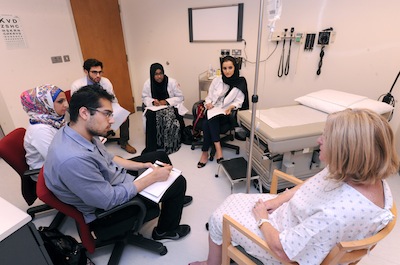Inter-professional workshop brings WCMC-Q and QU together
November, 2014

The initiative was designed to help students experience
inter-professional relationships.
Students of WCMC-Q and Qatar University’s (QU) College of Pharmacy explored the benefits of inter-professional educational approaches to patient care at a joint event held at WCMC-Q.
Thirty-five third-year medical students and approximately 30 third-year QU pharmacy students took part in the inter-professional education (IPE) workshop, which saw them work cooperatively with one another to hold consultations with standardized patients posing as a long-term diabetes sufferers with acute complications.
The World Health Organization defines inter-professional education as instances in which practitioners of two or more professions learn about and with each other to enable effective collaboration and improve healthcare outcomes.
Dr. Stella Major, associate professor of clinical medicine and director of the clinical skills center at WCMC-Q explained that the workshop’s goals were to provide a formal opportunity for medical and pharmacy students in Qatar to engage in IPE and to invite the participants to complete a voluntary survey, which explored their prior experiences and readiness to engage in IPE-based learning (RIPLS). This event marked the first such workshop conducted at WCMC-Q as part of the longitudinal curriculum.
Working in groups of six, each of the inter-professional teams was tasked with discussing the individual team members’ roles in the care of a diabetic patient, then collectively gathering the history from a patient, drawing up a joint patient care plan, and finally discussing and defending the care plan with a faculty member in the light of best clinical practice.
Dr. Stella Major said: “This event gives health professional students the chance to develop professional interpersonal skills so that they can relate better to one another, realize how much medical knowledge they share in common, and also discover ways in which their different sets of expertise can complement one another to provide the very best patient care possible.”
Many of the consultations were conducted in the clinical examination rooms of WCMC-Q’s state-of-the-art Clinical Skills Center, which allowed faculty members from WCMC-Q and QU to unobtrusively observe the students interactions via the audiovisual system.
WCMC-Q student Khalid Al-Dasuqi found the session helpful. He said: “I think it’s very important to build a productive relationship with members of other professions, so any opportunity to interact with them is valuable. We are able to discover where our skills overlap and where we can complement each other’s knowledge. It was also a great pleasure to meet the QU students and we are grateful that they came here to our college.”
Dr. Kerry Wilbur, associate professor and director of the doctor of pharmacy program at Qatar University’s College of Pharmacy, said: “I think the experience of working closely together really helped the students of both colleges to understand that this sort of positive inter-professional collaboration carries huge potential benefits for patients in terms of coordinating patient care to deliver the best possible health outcomes.”
